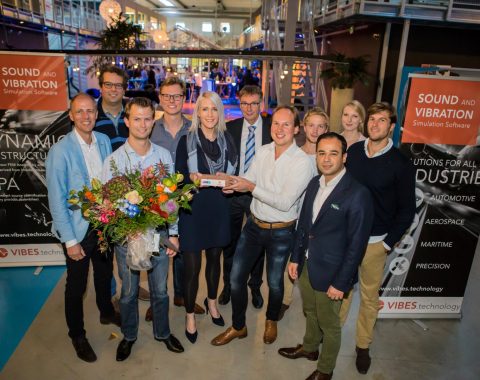PRESS RELEASE | VIBES receives growth capital from UNIIQ
19 October 2017
When designing vehicles and other products, such as wind turbines and precision equipment, the need to reduce vibrations and noise are considered important. The less a car vibrates and the quieter it runs, the greater the driving comfort and the longer the product life cycle. For this reason, engineers throughout the entire vehicle production chain continually work on eliminating vibrations and noise.
First-time-right engineering
To detect unwanted vibrations and noise in the current outdated methods, it is often necessary to build several product prototypes and perform a multitude of tests until the desired noise level is reached. In the automotive industry, vibration analysis is typically only possible in the final stage of product development. This leads to unnecessary and costly design cycles because engineers must return to the drawing board several times to avoid unwanted vibrations in a new prototype.VIBES.technology software makes it possible to identify noise and vibrations early in the design process and, where necessary, prevent them before physical prototypes are built. The technology, which uses dynamic substructuring, separates a product into components. The effect of each specific component on the vibration and noise level of the entire car or wind turbine can therefore be mapped individually. This allows engineers to identify potential problems very precisely at an early stage and then adjust these at component level. With VIBES.technology, expensive scale models no longer need to be built to accurately predict vibrations. VIBES.technology software saves the manufacturer a lot of time and money.Maarten van der Kooij, co-founder of VIBES.technology, says, “Thanks to UNIIQ’s investment, we can further develop the technology and current product in partnership with our customers to create a software solution that helps them improve measurements and analyses. We expect the solution we are working on to provide a solid basis for a product that will enable industry-wide efficiency gains in design processes aimed at noise and vibration reduction. In addition to this capital injection from UNIIQ, Rabobank Zuid-Holland Midden will also support us with a contribution from their innovation fund.”UNIIQ Fund Manager Liduina Hammer adds, “VIBES’s technology has the potential to secure an important position in design processes where vibrations and noise play a role. Given the knowledge of the team and the opportunities this technology presents, we are pleased to help these entrepreneurs develop and demonstrate their proof-of-concept.

© Daniel Verkijk
F.l.t.r.: Hans Dreijklufft (UNIIQ), Dennis de Klerk (VIBES), Daniël van den Bosch (VIBES), Maarten van der Kooij (VIBES), Liduina Hammer (UNIIQ), Theun Baller (decaan faculty Mechanical Engineering, TU Delft), Maarten van der Seijs (VIBES), Mathieu Wernsen (VIBES), Mazdak Zareei (Rabobank), Suzanne Kroeze (UNIIQ) en Eric Pasma (VIBES)
About UNIIQ
UNIIQ is a €22 million investment fund focused on the proof-of-concept phase, which helps entrepreneurs in the province of South Holland bring their unique innovation to market faster. UNIIQ offers entrepreneurs the seed money to achieve their plans and bridges the riskiest phase from concept to promising business. A consortium, including Erasmus MC, TU Delft, Leiden University and the regional development agency InnovationQuarter, created the fund. UNIIQ is made possible by the European Union, the Province of Zuid-Holland and the municipalities of Rotterdam, The Hague and Leiden. InnovationQuarter is responsible for the fund management.
Watch a short introduction to UNIIQ on YouTube.
